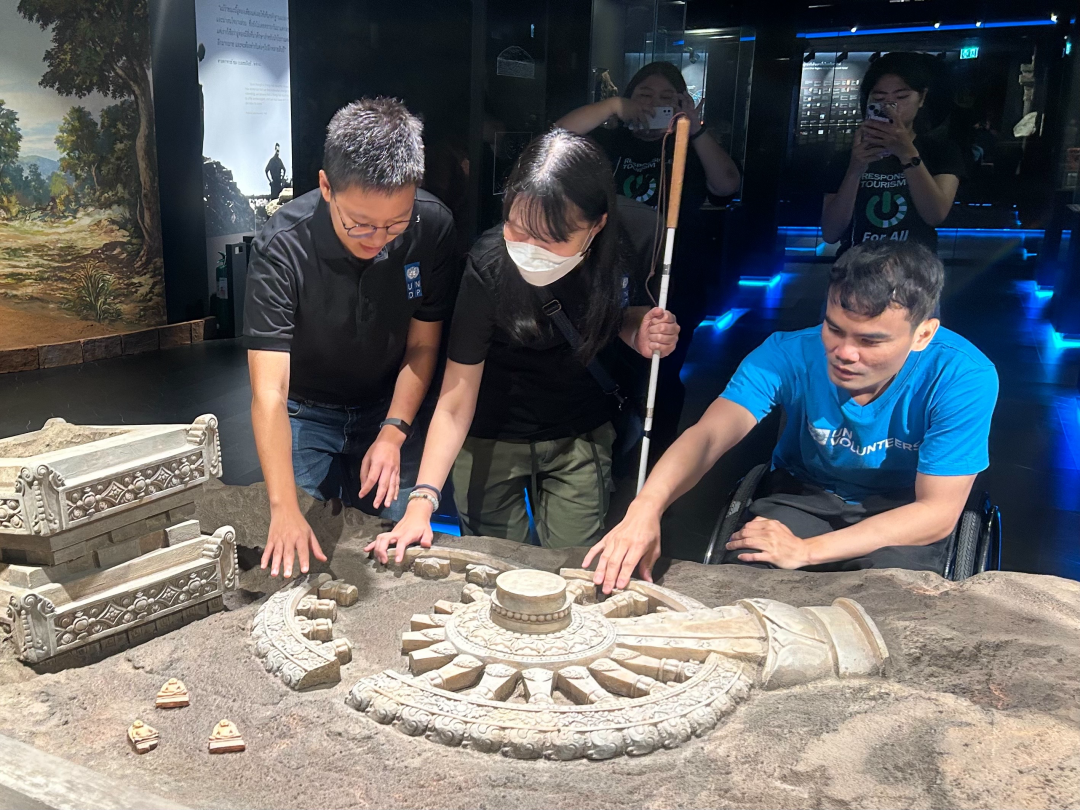Disclaimer:
Please be aware that the content herein has not been peer reviewed. It consists of personal reflections, insights, and learnings of the contributor(s). It may not be exhaustive, nor does it aim to be authoritative knowledge.
Title
Please provide a name for your action learning plan.
Community-Based Tourism For All (Part 2: Prototyping)
Challenge statement
Challenge type: If you are working on multiple challenges, please indicate if this is your "big bet" or "exploratory" challenge.
Please note: we ask you to only submit a maximum of 3 challenges - 1x Big Bet, 2x Exploratory. Each challenge must be submitted individually.
BIG BET
Challenge statement: What is your challenge? (Please answer in specific terms: "Our challenge is that...”.)
Our challenge is that tourism plays a major role in Thailand's development, but it may not be adjusting to the social changes such as aging society and the growing momentum for inclusive development. among others. We need to foster the kind of tourism that benefits local communities as well as allows everyone, elderly and persons with disabilities included, to enjoy tourism experiences - make it 'tourism for all'.
Background: What is the history of your challenge? What is causing or driving it? Who is involved? How does the current situation look like? What undesired effects does it produce?
Community-based tourism (CBT) is a tourism management model that ensures benefits to local communities - ‘tourism by the local people for the local people’. In 2022, the Accelerator Lab Thailand embarked on a journey to support the growing momentum for sustainable tourism by contributing innovative approaches to strengthen CBT. This year, the Lab realized that when it comes to 'tourism for all', CBT has even a greater challenge to develop tourism for all due to their limited resources and capacities. For instance, building infrastructures that comply to universal design principles usually require a large investment and technical knowledge that may not be available in the local communities. Thus, disability inclusion is often left untouched because people believe that they do not have the resources to do anything.
Between February and July 2023, the Lab already started gaining insights into the tourism experiences of persons with disabilities (PWDs) and working with 2 pilot communities to explore how to advance CBT for all.
Quantitative evidence: What (official) data sources do you have on this challenge that better exemplifies the importance and urgency of this frontier challenge? You can add text, a link, or a picture.
Qualitative evidence: What weak signals have you recently spotted that characterizes its urgency? Please provide qualitative information that better exemplifies the importance and urgency of this frontier challenge. You can add text, a link, or a picture.
As one of the world's top tourist destinations, Thailand's economic development benefits significantly from the tourism sector. The country seeks to maintain this position and continue to attract visitors by exploring various kinds of niche tourism e.g. gastronomy tourism, healthcare and wellness tourism, etc. Considering the aging society trend in many countries worldwide, tourism for all will not only serve the domestic tourism market but another attraction of Thailand in the global market. A local social enterprise working on CBT has already started to organize tours for PWDs from abroad to enjoy Thailand's tourism and has received very positive responses. We also see that more and more new establishments (including renovations) try to include accessibility facilities, but local communities still find it difficult to advance disability inclusion in the local setting.
Value proposition: What added value or unique value proposition is your Accelerator Lab bringing to solving this challenge? Why is it your Lab that needs to work on this challenge and not other actors within UNDP, other stakeholders in the country respectively? Why is it worth investing resources to this challenge?
With human-centered design, co-creation, and other innovation tools, UNDP Accelerator Lab Thailand can connect the perspectives of the PWDs in co-designing tourism for all initiatives for CBT, ones that do not have to always wait for large scale investment but leveraging on existing solutions and 'small tweaks' in both physical facilities and mindsets that will drive CBT for all forwards.
Short “tweet” summary: We would like to tweet what you are working on, can you summarize your challenge in a maximum of 280 characters?
Community-based tourism for all, inclusivity in Thailand's sustainable tourism development
Partners
Who are your top 5 partners for this challenge? Please submit from MOST to LEAST important and state Name, Sector and a brief description of the (intended) collaboration.
Please state the name of the partner:
Nutty's Adventures
What sector does our partner belong to?
Academia
Please provide a brief description of the collaboration.
Implementing partner. One of Thailand's leading social enterprises with extensive experience offering tourism services to PWDs travelers, including those from abroad
Is this a new and unusual partner for UNDP?
Yes
Learning questions
Learning question: What is your learning question for this challenge? What do you need to know or understand to work on your challenge statement?
We want to learn how local communities can make their CBT inclusive, meeting the needs of PWDs travelers with limited resources and utilizing local capitals e.g. traditional arts and knowledge.
To what stage(s) in the learning cycle does your learning question relate?
Explore, Test
Usage of methods: Relating to your choice above, how will you use your methods & tools for this learning question? What value do these add in answering your learning question?
In this phase, we will focus on co-creating prototypes by involving PWDs, local communities, and tour operator which has extensive experience with PWDs travelers.
Existing data gaps: Relating to your choice above, what existing gaps in data or information do these new sources of data addressing? What value do these add in answering your learning question?
Firstly, to ensure that the prototypes truly address the needs of PWDs traveler, we will engage PWDs representatives every step of the way and seek their continuous feedback. Secondly, we find a data gap in accessibility information which is crucial in the decision-making process of PWDs. We will explore the use of Google Map with a prototype of community-generated data to supply reliable information on accessibility facilities of CBT destinations.
Closing
Early leads to grow: Think about the possible grow phase for this challenge - who might benefit from your work on this challenge or who might be the champions in your country that you should inform or collaborate with early on to help you grow this challenge?
We plan to consolidate good practices on tourism for all and relevant social innovation tools applied with the pilot communities so interested communities in Thailand and globally can benefit from our experiences.
END OF ACTION LEARNING PLAN: Thank you! The form saves automatically and your submission has been recorded. You may now exit this window.


 9Industry, innovation and infrastructure
9Industry, innovation and infrastructure
 10Reduced innequalities
10Reduced innequalities 11Sustainable cities and communities
11Sustainable cities and communities
Comments
Log in to add a comment or reply.